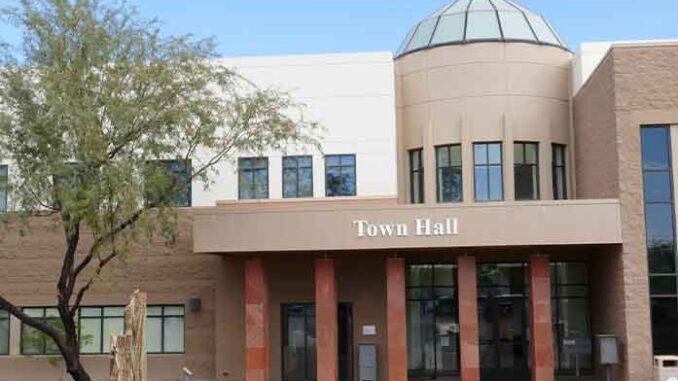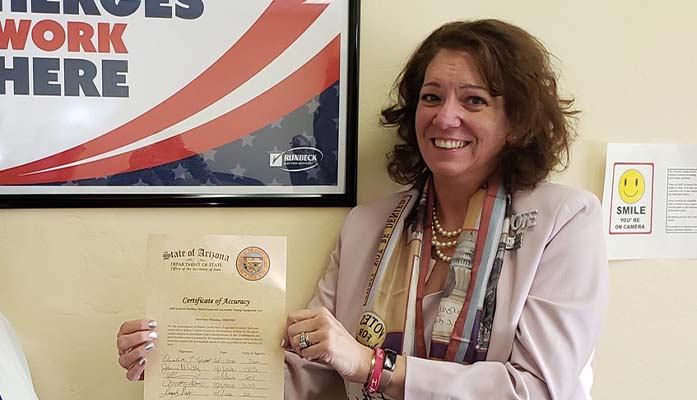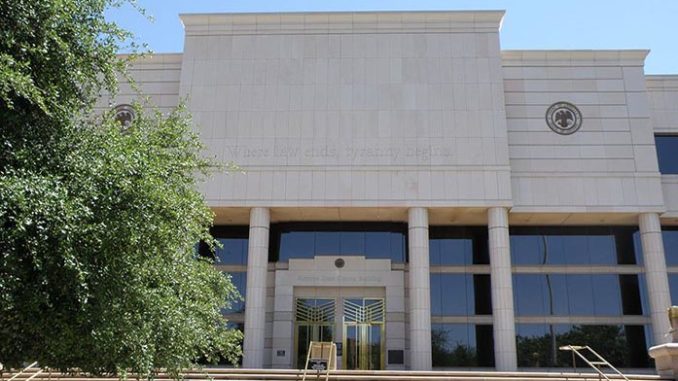
by Elizabeth Troutman | May 16, 2024 | News
By Elizabeth Troutman |
The Fountain Hills Town Council adopted its tentative budget plan for the upcoming fiscal year on a 6-1 vote May 7.
The council decided to set the budget at the maximum expenditure amount allowed under law, $45.1 million.
“Fountain Hills need to save some money and do more road repairs,” Councilman Allen Skillicorn said. “Last night the Liberal Ladies majority of council refused to cut just $1 from their ‘spend to max’ 2025 budget.”
Skillicorn, a Republican, suggested cutting 3% or $1.35 million from that budget to fund road repairs. The motion failed to receive a second. Skillicorn made a follow-up motion to cut the budget by just $1. This motion was seconded but failed three votes to four.
Voting to cut the budget were council members Gerry Freidel, Hannah Toth, and Skillicorn.
Mayor Ginny Dickey and council members Peggy McMahon, Sharron Grzybowski, and Brenda Kalivianakis voted against cutting just $1 from the budget.
“Four big spending Liberal Ladies voted for the maximum under law budget and could not cut just $1,” Skillicorn said. “If we cannot cut the budget by just $1 to fix roads, one wonders how Dickey, McMahon, Grzybowski, and Kalivianakis plan to fix our roads.”
Fountain Hills is a town in Maricopa County, Arizona with a population of roughly 24,000.
Elizabeth Troutman is a reporter for AZ Free News. You can send her news tips using this link.

by Elizabeth Troutman | May 16, 2024 | Economy, News
By Elizabeth Troutman |
Arizona Republican Rep. David Schweikert urged Americans to take “our fiscal responsibility” seriously in light of the Social Security Administration’s 2024 Trustees Report.
“I implore my brothers and sisters to take our fiscal responsibility seriously before it’s too late,” Schweikert said.
Schweikert, who serves as Joint Economic Committee vice chairman, issued a statement on the report, which projected that the Old-Age and Survivors Insurance (OASI) Trust Fund will become insolvent by 2033.
“The Social Security Trustees Report confirms that it’s no longer just future generations who should be concerned about receiving their full earned benefits but rather current retirees too,” Schweikert said
The congressman criticized Congress for failing to protect the entitlement programs millions of Americans depend on.
“As our nation’s fiscal health continues to deteriorate, Congress refuses to live up to its moral obligation to protect and modernize Social Security and Medicare,” he said. “It’s past time for the political class to put aside their talking points and start working on bipartisan solutions to save these programs for our seniors.”
According to the report, the Old-Age and Survivors Insurance Trust Fund is projected to become exhausted by 2033. Once the OASI Trust Fund goes insolvent, all beneficiaries will face an across-the-board 21% cut to retirement benefits.
The Disability Insurance (DI) Trust Fund will be able to keep paying full benefits through at least 2098. But the combined OASI and DI Trust Funds will become depleted by 2035.
Once the combined OASDI trust funds go insolvent, all beneficiaries will face an across-the-board 17% cut to retirement benefits.
The Hospital Insurance (HI) Trust Fund will become insolvent by 2036. At that point, the HI Trust Fund will only be able to cover 89% of total benefits.
The combined Social Security programs will run a cash-flow deficit of $169 billion this year and $2.7 trillion over the next decade.
Elizabeth Troutman is a reporter for AZ Free News. You can send her news tips using this link.

by Daniel Stefanski | May 15, 2024 | News
By Daniel Stefanski |
An Arizona Republican attempt to refer border security policies to the November General Election ballot is being met with severe resistance.
Earlier this week, Governor Katie Hobbs joined members of the Arizona Legislative Latino Caucus to reiterate their opposition to HCR 2060. The coalition wrote, “Over the past week, bipartisan organizations ranging from the Arizona Chamber of Commerce to border county law enforcement officials to immigrant rights groups have spoken up in opposition to the Republican-backed ballot referral that will kill jobs, drive away businesses, and demonize our communities of color. Yet again we join together to make it clear: this referral will not secure our border, and it will not make Arizonans safe.”
The group added, ““What it will do is prevent law enforcement from fighting violent crimes like robbery and sexual assault, cost state and local governments hundreds of millions of dollars to try and enforce this unconstitutional measure, leave a black eye on our state’s reputation, and lead to a onslaught of racial profiling. This will separate families and inflict emotional and economic damage on households and communities, especially children. And now Dreamers, who followed the process and gained a legal status, are also under fire as the measure plans for the Deferred Action for Childhood Arrivals (DACA) program to come to an end.”
The comments from Hobbs and her legislative allies follow a post from the Arizona Senate Republicans Caucus “X” account, which highlighted the Democrat governor’s refusal to do what was necessary to help her state secure its border and protect citizens.
Arizona legislative Republicans had expected a vote on HCR 2060 this week in the full Senate but were forced to postpone their plans due to one member of the Senate Republican Caucus being out of town (Wadsack) and one member expressing opposition to the measure as currently constructed (Bennett). A vote in the Senate chamber is still expected – maybe as soon as next week.
According to House Speaker Ben Toma, HCR 2060 would do the following (if approved by state voters):
- “The Secure the Border Act creates two new class 6 felonies for illegal aliens who try to submit false documents or information to evade Arizona’s strong E-Verify laws or obtain taxpayer-funded public benefits. It also requires state and local agencies to verify a noncitizen’s documents and eligibility for benefits through a federal database, known as the SAVE program, whenever noncitizens apply for public benefits.
- “The Secure the Border Act establishes a new class 2 felony with enhanced prison sentences for drug dealers of illicit and deadly fentanyl. Fentanyl is the leading cause of overdose deaths in Arizona, and the amount seized at the southwest border is unprecedented.
- “Finally, the Secure the Border Act incorporates legislation from Senate Bill 1231, which all House Republicans supported but Governor Hobbs vetoed, modeled on Texas Senate Bill 4, making it a crime for an illegal alien to enter or attempt to enter Arizona at any location other than a lawful point of entry.”
The efforts from Arizona legislators to send this referral to state voters comes two months after Governor Katie Hobbs vetoed SB 1231, the Arizona Border Invasion Act, which would have “ma[de] it unlawful for a person who is an alien (unlawful immigrant) to enter Arizona from a foreign nation at any location other than a lawful port of entry and outline[d] penalties for violations of illegally entering Arizona and provide[d] immunity from civil liability and indemnification for state and local government officials, employees and contractors who enforce this prohibition” – according to the purpose from the state Senate.
In her veto letter to Senate President Warren Petersen, Hobbs said, “This bill does not secure our border, will be harmful for communities and businesses in our state, and burdensome for law enforcement personnel and the state judicial system. Further, this bill presents significant constitutional concerns and would be certain to mire the State in costly and protracted litigation.”
Senator Janae Shamp, the sponsor of SB 1231, vowed that members of her party would continue to push forward solutions to combat the border crisis, saying, “The Republican-controlled Legislature will continue to prioritize closing our border and providing law enforcement with the tools they need. This veto is a slap in the face to them, Arizona’s victims of border-related crimes, and other citizens who will inevitably feel the wrath of this border invasion in one way, shape, or form at the hands of Hobbs and Biden.”
Daniel Stefanski is a reporter for AZ Free News. You can send him news tips using this link.

by Staff Reporter | May 15, 2024 | News
By Staff Reporter |
A top staffer for Secretary of State Adrian Fontes, a Democrat, is backing Maricopa County Recorder Stephen Richer, a Republican.
Fontes’ state elections director Lisa Marra praised Richer for his performance the past four years and encouraged people to vote for him.
“Maricopa County voters, including myself, are lucky to have Recorder Richer,” said Marra. “He’s responsible for so much more than just voter rolls. We need people like him in public office.”
Richer has faced widespread criticisms from within his own party over voter grievances with his view of the 2020 election’s validity and his administration of the 2022 election.
Aggrieved voters have made themselves a regular presence at the Maricopa County Board of Supervisors meetings. In September, voters made headlines for accusing the board and Richer of “deep state” affiliations.
Earlier this year, AZ Free News reported that he used his staff to compile news of his personal defamation lawsuit against Senate candidate and former gubernatorial candidate Kari Lake.
Part of the grievance with Richer had to do with the political action committee he established to beat GOP candidates supportive of the claim that the 2020 election was stolen. The PAC — Pro-Democracy Republicans of Arizona — was seen as an overt attempt to influence elections, and prompted lawmakers to introduce legislation to ban similar PAC building.
Richer’s PAC has raised over $88,500 since its inception in 2021 and spent about $83,000. In the summer of 2022, the PAC gave $45,000 to Defending Arizona Values, and $10,000 to Awareness Analytics.
Since last year, Richer’s PAC has paid him just over $8,000 for operating expenses, or just about $14,600 since the PAC’s inception.
Ahead of the 2022 election, Richer also advised the Department of Homeland Security on tactics to moderate free speech. A controversial right-wing outlet, the Gateway Pundit, successfully sued Maricopa County over its denial of press passes under Richer.
Marra apparently may relate: she faced similar revile as Richer during her stint as Cochise County Elections Director, a role she quit early last year.
Marra testified before the House Oversight and Reform Committee that she had received threats during her tenure over elections administration, a claim later discovered to not have any backing according to the Cochise County Attorney’s Office.
It was Marra who resisted the county’s efforts to conduct an expanded hand count audit during the 2022 election, citing since-scrutinized legal advice from the county attorney’s office.
That same attorney, Brian McIntyre, remains under investigation by the State Bar for violating the county supervisors’ attorney-client privilege by allegedly colluding with Attorney General Kris Mayes and Secretary of State Adrian Fontes.
McIntyre announced last month that he wouldn’t run for county attorney again, citing his inability to collect enough signatures to qualify for the ballot.
For her troubles while working in Cochise County, Marra received a settlement of $130,000 due to an alleged toxic work environment.
Richer’s primary opponent, State Rep. Justin Heap, has capitalized on the public discontent with Richer to advance his campaign.
AZ Free News is your #1 source for Arizona news and politics. You can send us news tips using this link.

by Daniel Stefanski | May 15, 2024 | News
By Daniel Stefanski |
Arizona officials recently took time to recognize the state’s correctional officers.
Last week, the Arizona Legislature celebrated Arizona Correctional Professionals Day.
The Arizona Senate Republicans Caucus “X” account posted, “Senate Republicans unequivocally support our men and women in public safety, and we are proud to celebrate Arizona Correctional Professionals Day at the Capitol. These dedicated men and women are a crucial community within our public safety sector and play an important role in protecting our citizens, as well as the rehabilitation of those who are incarcerated.”
Senator T.J. Shope also issued a statement to highlight Arizona’s correctional officers. He wrote, “We celebrated Arizona Correctional Professionals Day at the Capitol this week, and I had the honor of welcoming these public servants at a BBQ lunch by presenting them with a legislative proclamation recognizing their work. Arizona is dedicated to providing reentry and rehabilitation services for incarcerated individuals so that they may become productive citizens contributing to our society after release.”
Shope added, “Our state’s nearly 8,000 correctional officers and security staff are crucial to this mission. Their unwavering dedication, professionalism, and bravery in the face of challenging circumstances is to be commended. They truly demonstrate exceptional commitment to upholding the rule of law, ensuring humane treatment of the incarcerated, and fostering an environment for positive behavioral change. For the past 12 years, l’ve been honored to represent the men and women working in our private and public correctional facilities in Pinal County. Thank you for your service!”
Governor Katie Hobbs joined Shope and others to thank the men and women who serve in this specific line of work, declaring the week as “Correctional Officers and Employee Week.”
At the end of the week, the “X” account for the Arizona Department of Corrections and Rehabilitation posted, “THANK YOU to the entire ADCRR family for your ongoing effort and service as we reimagine corrections across Arizona. We hope you had a great Correctional Officers and Employees Week.”
Daniel Stefanski is a reporter for AZ Free News. You can send him news tips using this link.

by Staff Reporter | May 15, 2024 | News
By Staff Reporter |
The Arizona Supreme Court has once again pumped the brakes on the state’s total abortion ban which dates back to pre-statehood days.
The order in the case, Planned Parenthood v. Hazelrigg, offered a temporary lifeboat for abortion supporters awaiting possible appeal. The court’s order, combined with the separate directive in Isaacson v. Arizona, means the abortion ban won’t go into effect until Sept. 26 of this year.
The Arizona Supreme Court rejected attempts to nullify the total abortion ban last month. That ruling, posted here, reflected the justices’ commitment to following their “limited constitutional role and duty to interpret the law as written” and deferring to the legislature.
“To date, our legislature has never affirmatively created a right to, or independently authorized, elective abortion,” ruled the court. “We defer, as we are constitutionally obligated to do, to the legislature’s judgment, which is accountable to, and thus reflects, the mutable will of our citizens.”
A version of the total abortion ban dated back to Arizona’s territorial days, to the final year of the Civil War: 1864. The law on the books, A.R.S. § 13-3603, prohibits abortions except when necessary to save the mother’s life.
The Supreme Court’s injunction only served to reduce the amount of time the ban would be enforced. The Arizona legislature passed a bill repealing the total abortion ban; Governor Katie Hobbes signed the bill earlier this month.
Currently, state law banning abortions after 15 weeks remains in effect.
An activist group hopes to end all restrictions on abortion in the state by enshrining abortion as a constitutional right.
Arizona for Abortion Access is gunning to secure a constitutional amendment question on the November ballot. Most of the group’s funding has come from out of state. The activists have until July 3 to gather just over 383,900 valid signatures for ballot referral.
Leftist organizations and Democrats, including Hobbs, are in full support of making abortion a constitutional right.
In response to her signing the bill repealing the total abortion ban, Hobbs’ administration rolled out a website advocating for unfettered abortion access, painting those opposed to abortion as “radical extremists.”
The website also depicted crisis pregnancy centers as inaccurate and deceptive operations, citing an Attorney General Kris Mayes webpage portraying these centers as predatory with personal health information and potentially even dangerous.
Mayes celebrated the court’s decision. She said that her office may use the time afforded them to petition the U.S. Supreme Court.
“I am grateful that the Arizona Supreme Court has stayed enforcement of the 1864 law and granted our motion to stay the mandate in this case for another 90 days,” said Mayes. “During this period, my office will consider the best legal course of action to take from here, including a potential petition for certiorari to the U.S. Supreme Court.”
Apart from the additional stay granted, Mayes said that she opposed the Arizona Supreme Court’s ruling. Mayes indicated that abortion was a form of medical care.
“I continue to believe this case was wrongly decided, and there are issues that merit additional judicial review,” said Mayes. “I will do everything I can to ensure that doctors can provide medical care for their patients according to their best judgment, not the beliefs of the men elected to the territorial legislature 160 years ago.”
Former Attorney General Mark Brnovich, during his last months in office, backed the total abortion ban.
AZ Free News is your #1 source for Arizona news and politics. You can send us news tips using this link.






